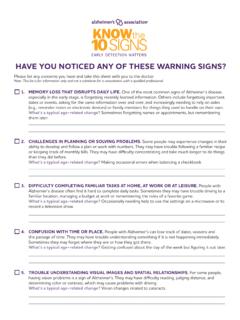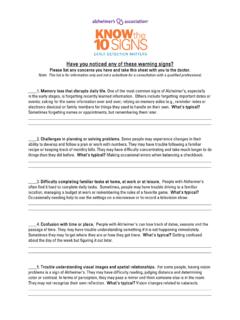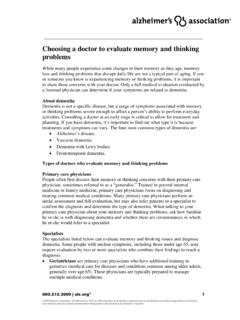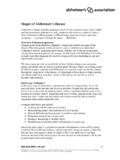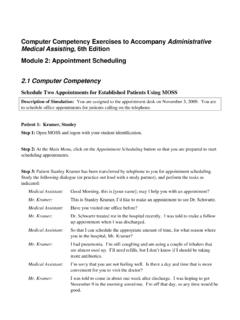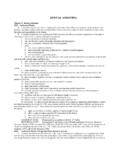Transcription of Legal Plans: Assisting a Person with Dementia in …
1 Legal PLANSCONSIDERATIONS FOR HELPING A Person LIVING WITH Dementia PLAN FOR THE 15/26/18 2:23 AM11 CONTENTS1. Legal capacity .. Legal documents .. Finding a lawyer .. Meeting with your lawyer .. 5. Terms your lawyer may use .. FOR THE FUTUREW hile it s important for everyone to plan for the future, Legal plans are especially vital for a Person diagnosed with Dementia . The sooner these plans are put in place, the more likely it is that the Person living with Dementia will be able to participate in the process. Legal planning includes: Preparing for long-term care and health care needs. Making arrangements for finances and property. Naming another Person to make decisions on behalf of the Person with brochure contains only general information and is not meant to be Legal advice.
2 Laws vary by state and are constantly changing. As a result, we make no warranty or guarantee of the accuracy or reliability of the information contained herein. You should consult a lawyer before acting on any information contained herein for advice specific to your 25/26/18 2:23 AM11 CONTENTS1. Legal capacity .. Legal documents .. Finding a lawyer .. Meeting with your lawyer .. 5. Terms your lawyer may use .. FOR THE FUTUREW hile it s important for everyone to plan for the future, Legal plans are especially vital for a Person diagnosed with Dementia . The sooner these plans are put in place, the more likely it is that the Person living with Dementia will be able to participate in the process.
3 Legal planning includes: Preparing for long-term care and health care needs. Making arrangements for finances and property. Naming another Person to make decisions on behalf of the Person with brochure contains only general information and is not meant to be Legal advice. Laws vary by state and are constantly changing. As a result, we make no warranty or guarantee of the accuracy or reliability of the information contained herein. You should consult a lawyer before acting on any information contained herein for advice specific to your 35/26/18 2:23 AM231. Legal CAPACITYIn most cases, if a Person living with Dementia is able to understand the meaning and importance of a given Legal document, he or she likely has the Legal capacity (the ability to understand the consequences of his or her actions) to execute (to carry out by signing it).
4 As long as the Person has Legal capacity, he or she should take part in Legal planning. A lawyer can help determine what level of Legal capacity is required for a particular document, as it can vary from one type of document to a Person living with Dementia signs a Legal document: Discuss the document. Make sure that the Person understands the document, the consequences of signing it and what he or she is being asked to do. Ask for medical advice. If you have concerns about the Person s ability to understand, a doctor will be able to help determine the level of his or her mental capacity. Assess existing Legal documents. Even if a living will, trust and power of attorney were completed in the past, it s important to review these documents for any changes and update as Legal DOCUMENTSL iving willA living will is a document that expresses how a Person who is physically or mentally incapacitated wishes to be treated in certain medical a living will, the Person may state, among other things, his or her wishes regarding artificial life support.
5 This document generally comes into play once a doctor decides that a Person is incapacitated and unable to communicate his or her desires regarding life-sustaining treatment. Some states may require a particular form for a living will; in others, it may be drafted by the Person s attorney. Check local TIPIf a Person living with Dementia travels outside his or her state, it s a good idea to check the local laws of their destination to find out whether existing Legal documents will be recognized 45/26/18 2:23 AM231. Legal CAPACITYIn most cases, if a Person living with Dementia is able to understand the meaning and importance of a given Legal document, he or she likely has the Legal capacity (the ability to understand the consequences of his or her actions) to execute (to carry out by signing it).
6 As long as the Person has Legal capacity, he or she should take part in Legal planning. A lawyer can help determine what level of Legal capacity is required for a particular document, as it can vary from one type of document to a Person living with Dementia signs a Legal document: Discuss the document. Make sure that the Person understands the document, the consequences of signing it and what he or she is being asked to do. Ask for medical advice. If you have concerns about the Person s ability to understand, a doctor will be able to help determine the level of his or her mental capacity. Assess existing Legal documents. Even if a living will, trust and power of attorney were completed in the past, it s important to review these documents for any changes and update as Legal DOCUMENTSL iving willA living will is a document that expresses how a Person who is physically or mentally incapacitated wishes to be treated in certain medical a living will, the Person may state, among other things, his or her wishes regarding artificial life support.
7 This document generally comes into play once a doctor decides that a Person is incapacitated and unable to communicate his or her desires regarding life-sustaining treatment. Some states may require a particular form for a living will; in others, it may be drafted by the Person s attorney. Check local TIPIf a Person living with Dementia travels outside his or her state, it s a good idea to check the local laws of their destination to find out whether existing Legal documents will be recognized 55/26/18 2:23 AM45 Power of attorneyA power of attorney document allows a Person living with Dementia (the principal) to name another individual (an agent or attorney-in-fact) to make financial and other important decisions on his or her behalf once he or she no longer can.
8 Typically, the agent is a spouse, domestic partner, trusted family member or agent should be chosen carefully. It s helpful for the principal to have a thorough conversation with the agent about what the responsibility entails. In addition, a successor agent (or agents) should be named in the event the original agent is unavailable or unwilling to of attorney documents should be written so that they are durable, meaning they are valid even after the principal is incapacitated and can no longer make his or her own Person living with Dementia maintains the right to make his or her own decisions as long as he or she has Legal capacity. Power of attorney does not give the agent the authority to override the principal s decision-making until the Person with Dementia no longer has Legal the principal is unable to make decisions, the agent is then authorized to manage the principal s income and assets.
9 The agent is responsible for acting according to the principal s wishes and in the Person s best of attorney for health careADVANCE DIRECTIVESA dvance directives are Legal documents that allow a Person to document preferences regarding treatment and care, including end-of-life wishes. Types of advance directives include: Durable power of attorney for health care. Living of attorney for health care A power of attorney for health care allows a Person living with Dementia to name an agent to make health care-related decisions on his or her behalf when he or she is incapable of doing so. These decisions include choosing: Doctors and other health care providers. Types of treatments.
10 Care a Person in the late stage of Dementia , the health care agent may also make end-of-life decisions, such as providing nutrition through a feeding tube or giving do-not-resuscitate (DNR) instructions to health care the time comes, these decisions can be difficult for families to make. Help avoid disagreements and distress by having open and candid conversations early on so everyone is aware of the end-of-life plans in will which is different than a living will is a document identifying whom a Person has chosen as: Executor: The Person who will manage the estate. Beneficiaries: The people who will receive the assets in the 65/26/18 2:23 AM45 Power of attorneyA power of attorney document allows a Person living with Dementia (the principal) to name another individual (an agent or attorney-in-fact) to make financial and other important decisions on his or her behalf once he or she no longer can.


